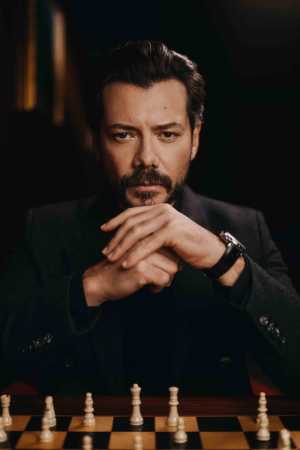The Duke of York’s Theatre in the West End often hosts big names that draw a crowd willing to pay top dollar to see a show. The last time I was here it was during Lily Allen’s run of The Pillowman and she had an extensive designer shoe collection taking up floor space in her dressing room, along with dozens of bouquets of flowers.
This time, while there are still some customary flower arrangements in sight, my eye is drawn to the numerous children’s drawings and family photos pinned up around the dressing room lights. Spanish actor Álvaro Morte, best known as the Professor from Netflix’s juggernaut series Money Heist, is the star of the play Barcelona, and I’ve come to meet him backstage before a matinée. He performs the two-hander opposite a different Lily: Lily Collins, better known as Emily in Paris. Between them, they have around 40 million followers on social media and the casting of high-profile Netflix stars has translated into many bums on seats.
Alongside the sentimental images and drawings hangs a painted image of the late Alan Rickman dressed as Severus Snape. “I would say he’s my favourite actor,” Morte tells me. “Sometimes I think of him, when I have any hesitation around doing a project, or an interview. I’m always like, what would Alan do? It helps me.”
Like Rickman, Morte has a deep voice, albeit with a distinct Spanish accent that comes through when he speaks. Wearing a simple black Deus T-shirt and a pair of unfussy glasses, he’s understated and warm on first impression. Though he is now a global name from Money Heist, this wasn’t always the case. He struggled for years as a jobbing actor in Spain, wondering if he should quit the industry before he landed the role that would change his life.
“All this huge success came when I was 40 years old and it’s really hard sometimes when you don’t know how to pay your rent, and you have to survive, you must continue, pushing, pushing, pushing,” he explains.
“But I’ve always thought that if you want to be an actor, the thing that you have to like is the path itself: going through auditions, getting the ‘no’s, not having any stability. Because not many of us will have this kind of success – which is a word that I don’t like to use.”
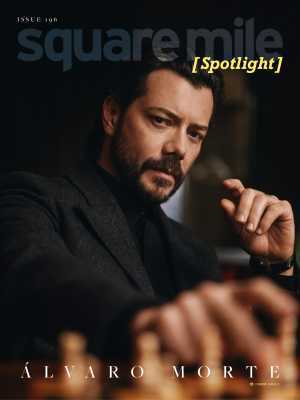
Originally, Morte started studying telecommunications engineering at university, influenced by parents who wanted to encourage him towards a stable career path. “I didn’t even know that it was possible to study to become an actor. I was completely apart from this universe. I have no one in my family connected to the arts. I mean nothing. Zero.”
His trajectory changed when he came upon auditions for a short film. A fuse was lit and he switched to study dramatic arts, moving from the Canary Islands to Cordoba in the south of Spain before spending two years continuing his theatre studies in Finland and moving back to Madrid.
He was serious about trying to build a credible profile for the long-run, which required some difficult decisions. “When I was 25 years old, having not even €1 in my bank account I had this offer to do a commercial. They would pay me thousands of euros and I said no because I didn’t consider it was a good thing to do. Because if you make that commercial and suddenly you become “the cheese guy”, after that, who’s gonna give you proper character and take you seriously? Maybe someone will but I didn’t want to take that risk”.
In fairness, I’m not sure that Alan Rickman ever did a cheese commercial either. But Morte’s big break didn’t come along for another 15 years so he had to put a lot of time into grafting and honing his craft. Now, he sees how that work has paid off and helped him to navigate the world he occupies with a level head.
“With social media, I think it’s very dangerous that we get this message that you have to be handsome, you have to be strong, you have to be intelligent, you have to be rich. If you are not rich and beautiful and successful by the age of 20 you are a disaster, you’re a loser! I mean, what?” He shakes his head. “I’m very concerned about the young generation. That the window to the world is through a screen in the phone.”
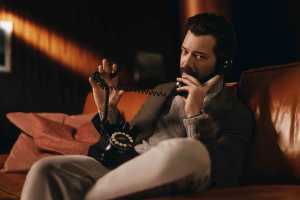
Full look: Zegna
It’s fitting that Morte is climbing out of the screen himself and returning to his theatrical roots, something he’s clearly very passionate about. “Theatre and culture are an open window to the world. When you go to the theatre and you can see someone on the stage who is going through some feelings, some emotions that you can connect with, you can have some empathy – you can understand much more about yourself, about the society you live in, about things that happened to other people that you can connect with. Even the things that happened to you. That’s very, very interesting.”
Barcelona hinges on the story of a Spanish man who meets an American woman out on a bachelorette party in the Catalan capital and brings her home. Without giving any spoilers, the play at one point touches on a political event that happened in Madrid a few years ago which rattled the whole country. Both Morte and his character hold strong feelings about the circumstances around that event. Part of the appeal of doing this play in particular for Morte was being able to generate awareness and discussion around this moment to a wider audience.
“There are people from all around the world coming to London just to see some theatre – among other things. For example, every time we go out of the stage door after the play we find people who’ve come from Japan to see the play, from Ecuador, from Peru, from many places around the world. So I have the opportunity to talk to all these people about something that happened in Madrid. That was one of the reasons that helped me to say ‘yes’”.
While he wants to be taken seriously and deal in serious subjects, Morte is also keen to remember that at its core, his objective is to entertain people. “That’s our intention; we just want you to have an hour and a half of fun and forget about your problems and troubles in your day. You just come here to connect with us and we go through this journey together and enjoy it. But if a part of that is you get this message and you can grab a beer afterwards and talk about what we did and we generate some debate, that’s awesome.”
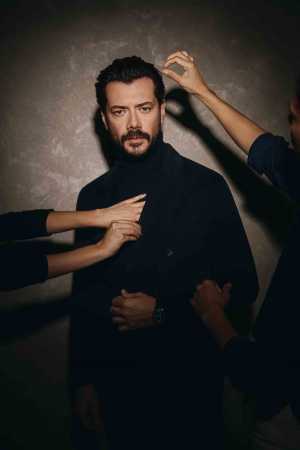
Full look: Thom Sweeney | Watch: Breitling
As a Spaniard, Morte has been enjoying his time soaking up the cultural energy in London, and admires how the arts are treated in this country. “How you protect and respect culture here is something amazing. I’m not used to that,” he says, citing literature, art, architecture and photography as areas of excellence in London. He sees them as being revered and preserved in this country specifically.
“You consider them part of your history in a very good way. You have a good actor here and you make him a Sir, a title – Ian McKellen for example or Laurence Olivier. It’s something you’re proud of and you take care of your culture because that’s part of you and it defines you – that’s what I feel being a foreigner here.”
He’d like to see a similar investment and reverence given to great cultural practices and icons that exist in Spain, such as flamenco. “We’ve got thousands of amazing things. With the passion that we put into things, maybe because we’re Latin, I don’t know, but our red warm hot blood in our veins sometimes make things feel…different?” He’s on a roll, clearly holding a lot of love for culture in his home country.
“You see any movie from Almodóvar you know is like something special, just like this,” he clicks his fingers. “You just see one shot, a picture, a frame, of the movie and recognise this is an Almodóvar film and that’s something very, very special.”
And it’s not just contemporary art: Morte is passionate about historical icons too. “We have got a really strong cultural heritage, we’ve got Federico García Lorca, we’ve got Miguel de Cervantes, Lope de Vega, Picasso… we have a very extensive bunch of people who’ve been creating culture but sometimes some of them had to develop themselves abroad because it was very difficult in Spain.”
He pauses. “You know that will destroy my career in Spain, be careful how you write that.” He smiles but looks a little anxious. “I am so proud of my culture in Spain and, it’s just that we don’t have, maybe, the help and the support that I consider that the culture should have. You and I, we will die, but Lorca will never die and we have to protect those priceless values. Please write that I am talking about this in a very loving way.”
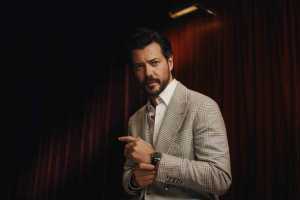
Full look: Brunello Cucinelli | Watch: Breitling
I tell him that I understand the sentiments and that here in the UK people are increasingly concerned about the impact that cuts to arts funding will have on the cultural landscape. It’s understandable that given his journey he wants to use his platform now to speak about investment in the arts and culture too. It’s one of the delicate privileges that comes with the high visibility that he now has in Spain since working on Money Heist.
“On a personal level, it’s also changed many things, many things because you lose your anonymity and there are some times that you would love to be anonymous again, to get back to your life and be able to just jump into the sea surrounded by people who don’t know you or sit down in the middle of the restaurant surrounded by tables and be anonymous. But I am not anonymous anymore.
“Suddenly you have an explosion of success that you don’t know how to manage. Nobody teaches you how to do that and suddenly everything you say could be turned into a headline.” I understand why he is so concerned that I convey his tone the right way when he is speaking about Spanish culture. Taken out of context it could cause him a headache. But overall he is clearly happy and grateful for what the show did not just for him, but also for international television.
“We are not the first, and we are not the best, but I think that we helped to tell to the rest of the people ‘Hey guys if we made it in Spain without a really good budget, you can do it anywhere – in Poland, in Nicaragua… Before Money Heist everything that had an international audience was coming out of the States. Not any more. We helped to change that. In a way we broke some boundaries and I’m so proud.”
Money Heist undeniably changed the landscape but following the writers’ strike more than half of the British TV and film industry are reportedly still out of work. With concerns about how AI could shake things up there is a fear for the future. Morte started out in engineering and sees the potential that technology holds to help society but he is concerned about AI’s role in the future of the arts.
“The question is, how are we going to use it? Are we going to begin doing movies with fake actors? Are we gonna be doing movies written by fake scriptwriters? That terrifies me because I think that the arts should be connected to a human being, because it’s part of us. If it’s going to be handled by a machine, it really scares me.”
While actors today can be part of the process of pushing back against directors or suggesting changes to scripts, AI may take away some of that influence or autonomy simply by giving producers the ability to override them and recreate their image in whichever way they want.
“A script is something that someone puts on the table like a path but you have to walk that path [as an actor] and how you walk that path belongs to your creation and the director and the work with your colleagues… you put your creativity at the service of that project. So, with the help of the director, you control what you do. And that’s your decision and that’s your proposal and that’s why they ask you to do this job. But if part of my creation is not going to be mine, it’s going to be coming from a machine, it’s not going to be my creation and it’s going to be separated from my humanity. I can see that could be dangerous in a philosophical way.”
It is clear once again that we’ve touched an area that Morte is very passionate about and he is thoughtful and animated as he speaks. “I think this is a very important question. I wouldn’t be surprised if with AI I had possibility in the future – to be at home and ask a platform, ‘Hey, give me a movie with Julia Roberts and why not, Humphrey Bogart, even though he is dead, and I want a romcom, but I just have 45 minutes, so make a short movie’ – and I can be served up what I ask for.’”
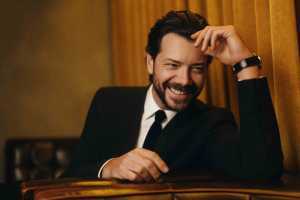
But Morte is confident that the element of surprise is one that keeps cultural offerings engaging and unique and is not something that a computer can easily and authentically replicate. Which brings us back to his current play and the power of bringing bodies together in a room. “I consider that theatre could be something that could survive AI because it’s a real experience between human beings. You’re going to see an actor there, you’re not going to see a hologram… Or maybe…?”
For the moment, this isn’t something that Morte has to worry about. He has two films that he has finished and will be promoting, plus a theatre and production company that he founded with his wife back in Spain, which is developing some series ideas at the moment. He’s keen to work on the other side of the camera too.
I’ve read somewhere that he overcame cancer at the age of 33 and I wonder how that experience has shaped his approach to work and life. He takes a moment to consider the question. “What cancer gives you is maybe to not be afraid of any stupid things,” he says. “The only thing I am afraid of would be anything to do with my kids but nothing that relates to me. To find the priorities in your life – but actually I have to say that is something that I was doing before – it was confirmation that I was on the right path.”
This path has taken Álvaro Morte around the world. Today, Barcelona and London. Tomorrow? We shall see.
Barcelona runs until 11 January 2025. Get your tickets here
